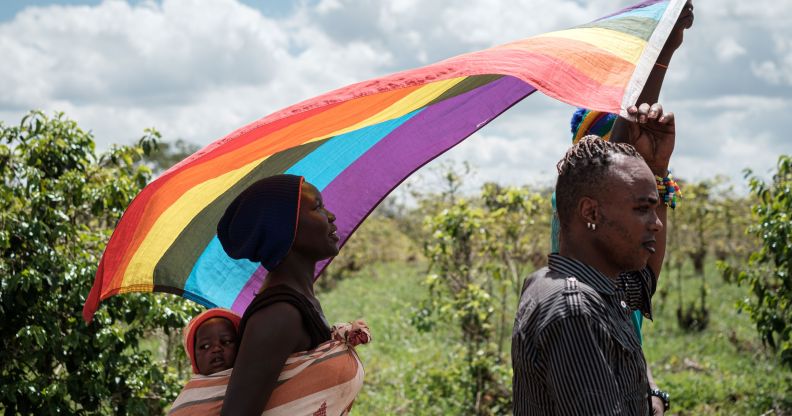Kenya sends LGBT refugees back to ‘homophobic’ camp

LGBT+ refugees protest outside of the UNCHR building. (Yasuyoshi Chiba/Getty)
Kenya has ordered a group of LGBT+ refugees to return to a camp where they faced homophobic violence.
Kenya’s armed police reportedly escorted the group of 76 people back to the camp in Kakuma on Wednesday night (June 19).
The refugees—including at least 20 children, according to the Thomson Reuters Foundation—were moved to safe houses in Nairobi by the United Nations Refugee Agency (UNHCR) after a series of violent attacks.
The first among them fled in December 2018, after a protest outside the UNHCR building saw several LGBT+ people attacked by fellow refugees and locals. At the time it was described as a “permanent relocation.”
However on Thursday (June), the UNHCR told the BBC that the Kenyan government decided the refugees “should be living in camps and, if they reside outside of camps, it should be with appropriate documentation.”
The announcement coincided with World Refugee Day, which seeks to highlight the plight of the 70 million people who have been displaced from their homes around the world.
Refugee left scarred after Kenya camp attack
One refugee, originally from Burundi, told BBC Great Lakes he had been left with a facial scars after being violently attacked in the Kakuma camp.
Frank (not his real name) said that the camp’s administration told the LGBT+ group at the end of 2018 that they were no longer able to protect them from violence.
Some of the group fled immediately. In April, Frank joined them in Nairobi, where he said that they faced further attacks by neighbours.
“Wherever we have lived we face homophobia because of our orientation, we don’t know where to flee to,” he said
“Wherever we have lived we face homophobia because of our orientation.”
—An LGBT+ refugee in the Kakuma camp, Kenya
The UNHCR has said that it will protect the LGBT+ refugees while they are living in the camp.
Gay sex is illegal in Kenya
Gay sex remains illegal in Kenya after its High Court ruled against decriminalisation on May 24.
Under the colonial-era sodomy law, sexual acts “against the order of nature” are punishable by up to 14 years imprisonment.
The Thomson Reuters Foundation reports that most of the refugees come from the Congo, where according to UN figures, over 800,000 people have been forced to seek refuge in other African countries following widespread unrest.
Others hail from Rwanda, Burundi, Tanzania, Ethiopia and South Sudan.

